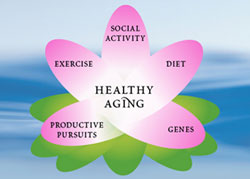The secret to long life
The goal is to die young at an old age.
 |
| Genes are just one factor in having a long and healthy life. Diet, exercise, productive pursuits and social activity are important as well. (Illustration by Tracey O’Donnell) |
S. Michal Jazwinski, a geneticist who has studied the aging process for more than 25 years, might be expected to say that the secret to a long and healthy life is all in the genes. But he points out other factors – diet, exercise, productive pursuits and social activity – that contribute to living long and well.
Genes do matter, though. Jazwinski was the first scientist to clone or isolate a longevity-associated gene in any organism.
The human biological system is quite complex; it involves networks of different reactions going on at the same time, each affecting the other. There is "a narrow window where everything seems to work nicely," Jazwinski says. "But you can only go so far in tweaking a certain gene and its expression to increase life span."
Jazwinski says that he and his colleagues are most interested in healthy aging in humans. "The whole idea is to compress morbidity, to make the period of decline [before death] as short as possible, so that everyone can die young at an old age." |



